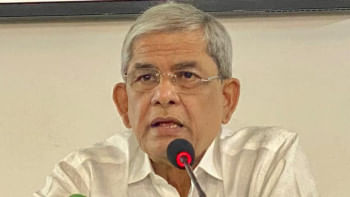India launches South Asia satellite today
Bangladesh is not yet ready to benefit from the South Asia Satellite, the first common satellite of this region, which is set to be launched today by Indian Space Research Organisation (ISRO).
So far, Bangladesh has no landing station that can establish a link with the satellite. It will take four-five months to complete building a downlink station in Gazipur, said Shahjahan Mahmood, chairman of Bangladesh Telecommunication Regulatory Commission (BTRC).
“We are establishing two satellite landing stations for our own Bangabandhu-1 satellite and one can be used for the South Asia Satellite,” said Mahmood. The second landing station is at Rangamati.
The government has not taken a decision in this regard, Mahmood added. On March 23, Bangladesh officially became a part of the South Asian Satellite after BTRC signed a deal with Indian High Commissioner in Dhaka, just before Prime Minister Sheikh Hasina's visit to India on April 7.
The South Asian Satellite will have 12 transponders and Bangladesh would be able to use one of them for free, according to the deal. One transponder is equivalent to 40 MHz of spectrum.
But to get the facilities, Bangladesh will have to set up an earth station in the country with its own funding for the use, the deal also mentioned.
“Actually, Bangladesh, as a member country of this satellite, was not much aware that India will launch it so fast,” Mahmood said.
Bangladesh is also taking preparations to launch its first satellite, which will have a capacity of 36 transponders, on December 16 and for that, BTRC began building its two landing stations last year.
A satellite is very sophisticated and involves complex technology and its infrastructure cannot be built overnight, said the BTRC top boss.
After Bangladesh, India also inked deals with Nepal, Bhutan, Sri Lanka and the Maldives; Afghanistan is expected to join later. Pakistan refused to join since the very beginning.
The satellite is being funded and designed by India involving $400 million.
Even though the Bangladesh government has not taken any decision on the maintenance and operations of the South Asia Satellite, it is going to form a company named Bangladesh Satellite Communication Ltd to do so.
Earlier, Indian Prime Minister Narendra Modi first raised the idea of the South Asian Satellite in the Kathmandu Saarc summit in 2014.
The benefits associated with participation in the project include tele-education, tele-medicine and inter-government networks, emergency communication for disaster situation, television broadcast and direct-to-home (DTH) television services.
Different media in India yesterday on their reports termed this initiative as 'space diplomacy' and the first of its kind.
While singing the deal with BTRC, Harsh Vardhan Shringla, Indian high commissioner in Bangladesh, said this is a part of their prime minister's 'neighbours first' foreign policy -- to add substantial to ties with neighbours and further their common agenda of regional integration.

 For all latest news, follow The Daily Star's Google News channel.
For all latest news, follow The Daily Star's Google News channel. 



Comments